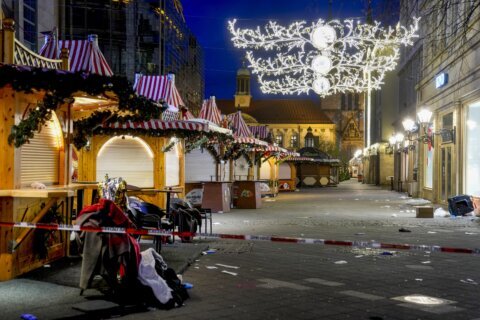DHAKA, Bangladesh (AP) — Thousands of members of three youth and student bodies belonging to the Bangladesh Nationalist Party marched toward the Indian High Commission in the country’s capital on Sunday to denounce attacks on a diplomatic mission and alleged desecration of Bangladeshi flags in India.
The protests came a day before India’s foreign secretary, Vikram Misri, is due to visit Dhaka amid growing tension between the two neighbors in recent months.
It will be the first high-profile diplomatic visit by an Indian official since the fall of former Prime Minister Sheikh Hasina, who is in exile in India, in August.
Bangladesh, which is predominantly Muslim, has accused the majority Hindus in India of attacking the Assistant High Commissioner’s office at Agartala in the Indian state of Tripura and desecrating Bangladeshi flags in Kolkata in West Bengal state.
India said it regretted the attacks and pledged to take action against those responsible. Bangladesh’s Ministry of Foreign Affairs also summoned the Indian High Commissioner and protested formally.
On Sunday, thousands of supporters of the BNP, which is headed by former Prime Minister Khaleda Zia, marched toward the Indian High Commission, but police stopped them by setting up barbed wire fences. They later allowed a team of six leaders of the three associate bodies of the party to hand in a letter to the High Commission.
The BNP last ruled Bangladesh in 2001-2006 in partnership with the Jamaat-e-Islami party. In the absence of Hasina, Zia’s party is the main force and it is expected to win the next election if it happens sometime soon.
Hasina, whose party is seen as more secular than the BNP, is highly regarded by India as a trusted friend. Most Hindus in Bangladesh are considered to be supporters of Hasina’s Awami League party.
The BNP supporters chanted slogans such as “Delhi or Dhaka? Dhaka, Dhaka!” and “Agents of India, be careful, be careful!” They also carried banners reading “We have friends overseas, but not masters.”
The protesters said India has been trying to instigate communal riots in Bangladesh to achieve political mileage since the ouster of Hasina, who fled to India following a mass uprising that ended her 15-year rule. Hasina’s party is struggling to get back on the streets while Hasina herself is facing arrest warrants on charges of crimes against humanity involving the deaths of hundreds of protesters during the uprising in July and August.
Over the past few weeks, some smaller Islamist groups and the BNP have protested against India over the attacks in Tripura and urged the interim government, led by Nobel peace laureate Muhammad Yunus, to officially raise concerns.
The situation started becoming tense after authorities in Bangladesh last month arrested a prominent Bangladeshi Hindu leader and jailed him, pending further legal procedures.
India had earlier officially raised concern over allegations of attacks on Hindus in Bangladesh after the fall of Hasina. Yunus and his close aides said the reports were exaggerated.
Bangladesh has been navigating crucial challenges since August amid mob violence, rising commodity prices, street protests and an unstable economy. The presence of Islamist groups has been visible more than ever in recent months.
The police are demoralized because many of their colleagues were killed in the protests and law and order remains a major concern, with rights groups also calling for ensuring press freedom. About 700 inmates including many criminals and radical Islamists still remain at large after jailbreaks during the political chaos in August.
Yunus has been urging people to stay calm, promising improvement.
Copyright © 2024 The Associated Press. All rights reserved. This material may not be published, broadcast, written or redistributed.





